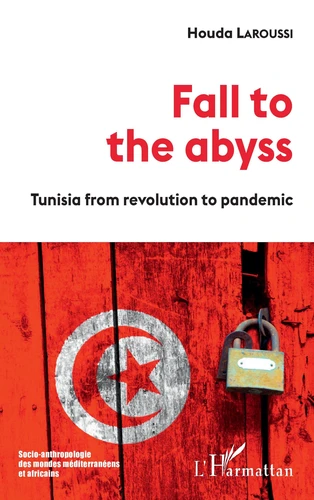Fall to the abyss. Tunisia from revolution to pandemic
Par :Formats :
- Paiement en ligne :
- Livraison à domicile ou en point Mondial Relay entre le 29 juillet et le 31 juilletCet article sera commandé chez un fournisseur et vous sera envoyé 3 à 6 jours après la date de votre commande.
- Retrait Click and Collect en magasin gratuit
- Livraison à domicile ou en point Mondial Relay entre le 29 juillet et le 31 juillet
- Réservation en ligne avec paiement en magasin :
- Indisponible pour réserver et payer en magasin
- Nombre de pages120
- PrésentationBroché
- FormatGrand Format
- Poids0.151 kg
- Dimensions13,5 cm × 21,5 cm × 0,1 cm
- ISBN978-2-343-23175-4
- EAN9782343231754
- Date de parution27/04/2021
- CollectionSocio-anthropologie des monde
- ÉditeurL'Harmattan
Résumé
This essay shows that the covid 19 has become a social phenomenon that deeply imprints individual and collective behaviours, both in social distancing and in solid laarity. He interprets the pandemic as a radical change, an unprecedented shift in the course of societies. This Coronavirage is an opportunity for the author to examine, from Tunisia, another order of the world. Tunisian society is apprehended in a new geopolitical framework : its links with the United States and its allies in the Near East, in a context of American-Chinese rivalries and the weakening of Europe.
Tunisia is revealed in its internal logic of response to the pandemic, notably by the persistence of political and financial corruption, as well as by the resurgence of the parallel market and informal practices. In this perspective, the author in respondent to a new project of social and solidarity economy, which would take place in the construction of a third sector, in complementarity with the respondent to the private sector, to replace the current informal and clandestine practices.
Tunisia is revealed in its internal logic of response to the pandemic, notably by the persistence of political and financial corruption, as well as by the resurgence of the parallel market and informal practices. In this perspective, the author in respondent to a new project of social and solidarity economy, which would take place in the construction of a third sector, in complementarity with the respondent to the private sector, to replace the current informal and clandestine practices.
This essay shows that the covid 19 has become a social phenomenon that deeply imprints individual and collective behaviours, both in social distancing and in solid laarity. He interprets the pandemic as a radical change, an unprecedented shift in the course of societies. This Coronavirage is an opportunity for the author to examine, from Tunisia, another order of the world. Tunisian society is apprehended in a new geopolitical framework : its links with the United States and its allies in the Near East, in a context of American-Chinese rivalries and the weakening of Europe.
Tunisia is revealed in its internal logic of response to the pandemic, notably by the persistence of political and financial corruption, as well as by the resurgence of the parallel market and informal practices. In this perspective, the author in respondent to a new project of social and solidarity economy, which would take place in the construction of a third sector, in complementarity with the respondent to the private sector, to replace the current informal and clandestine practices.
Tunisia is revealed in its internal logic of response to the pandemic, notably by the persistence of political and financial corruption, as well as by the resurgence of the parallel market and informal practices. In this perspective, the author in respondent to a new project of social and solidarity economy, which would take place in the construction of a third sector, in complementarity with the respondent to the private sector, to replace the current informal and clandestine practices.





















